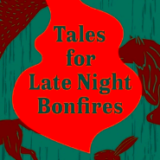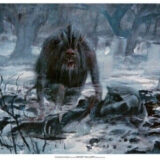
OBIR: Occasional Biased and Ignorant Reviews reflecting this reader’s opinion.
 ANATHEMA, Spec from the Margins – Issue #7, April 2019
ANATHEMA, Spec from the Margins – Issue #7, April 2019
An online tri-annual speculative fiction magazine of work by “queer POC / Indigenous / Aboriginal creators” published by Editors Michael Matheson, Andrew Wilmot, and Chinelo Onwualu out of Ontario, Canada.
Cover: Fajar by kiDChan
Editorial: In Which We Come to Better Know Ourselves – by Michael Matheson
Review:
Michael congratulates SFWA for raising standard rates to 8 cents a word this coming fall and then complains about the potential dark side of this progress, that it might perpetuate “the straight white hegemonic, patriarchal power structure … of magazines run by white publishers and editors with primarily white readerships ….” Seems to me his editorial comes across as a call for a crusade against an entrenched foe, a declaration of war on the editorial powers that have, until now, shamefully neglected “Spec from the margins” writers. Michael refers to this conflict as “decolonization,” which, historically speaking, is apt and accurate. I agree this is a worthy goal. I disagree that it is necessary to combat the old in order to accomplish the new. There’s room for both, room to celebrate all forms of SpeciFic literature.
In my opinion, on a practical level what’s needed are new publications that specifically serve alternative niche markets, be they culturally or ethnically defined, that provide more and more opportunities for original voices and fresh perspectives, the more the merrier. I see the future of SpecFitLit as an explosion of freedom and expression, as a positive cultural evolution in which there is no place for prejudice of any kind, as an expansion of creativity in which towers of imagination soar into multiple skies and dimensions previously unknown. That’s how I visualize the future of our beloved genre. I believe there’s ample evidence it is happening already. Good things are on the horizon. Wonderful things. Such as Anathema Magazine.
Moses – by L.D. Lewis
Premise:
Moses is a typical twelve-year-old girl standing in the pouring rain, enduring the taunts of a bully named Chad who has grabbed her pack to expose her books to the wet, worried what Chad might do to her little sister Jo who is sniffling under her umbrella and pleading to go home. Moses makes Chad go away. In an instant. Just a little bit of ash left behind. She didn’t know she could do that. It changes her life, and not for the better.
Review:
This story is all about emotion, about the curse of empathy and the need to avoid it, about guilt and regret, about the fear of love and the risks it entails, about frustration and denial over a complete loss of control over one’s ability to live, and above all, about desperation and longing to escape feeling and blank out emotion to the point of no longer being self-aware. The proverbial “life of quiet desperation” doesn’t even begin to cover it. Of course Moses has become a drug addict. And a booze addict. And a perpetual refugee who flees all emotional attachment to her sister or to anyone who raises even the faintest hint of empathy within her. What no one understands is that these are not her problems. They are her solutions, her only answer to her one problem, the ability to make people disappear, an ability often beyond her control, and yet sometimes so damned useful. Life sucks.
Superficially this is just a glimpse into the life of a drug addict, and a vivid glimpse it is. A definite film noir sense to the description, and the characters. It’s also a horror story, and not just because of the wishful fantasy aspect of causing annoying people to melt away when convenient. The real horror is how quickly life can go awry and spiral out of control, creating an utterly despairing sense of helplessness and how that in turns leads to rage directed against others and rage against oneself. Hence self-abuse of one kind or another as the last refuge of control and self-discipline.
This strikes me as a particularly mature piece of writing, as a psychologically sound description of a genuine non-fictional horror, namely the innate capability within all of us to abandon ourselves, to deny our very being, in a last ditch effort to escape from life beyond our control. This is very much fiction about reality.
So, a total bummer? Depressing as hell? Yes and no. Though I may be just fooling myself, I think it gives me a better insight into the problems drug addicts face, stirs a bit of empathy within me, perhaps allows me a more objective lens to view their problems and their lives.
Anyway, no matter what interpretive spin a reader puts on it, this is one powerful piece of writing. Impressive.
Raices (Roots) – by Joe Ponce
Premise:
Jerry lives close to the US/Mexican border. He shares his house with his sister Lola and his Nephew Macho, both of whom are illegals. He makes the mistake of taking Macho, in costume as Copper Hero, to see the latest Mexican/American blockbuster film “The Upholders 3: Time and Space Wars.” One of the protesters across the street throws a beer bottle, striking Macho’s leg, which instantly festers. The hospital room is crowded with kids all suffering from the same symptoms. Nothing to be done. Once home, Lola insists she and Macho stay home, hidden, with none of their neighbours, many of whom are already vigilantes, permitted to enter. The disease begins spreading to adults. Slowly, painfully, the afflicted are turning into trees. Prisons, detention centres and courthouses are soon awash in dried leaves. Vigilantes and soldiers armed with herbicides and chain saws are everywhere. Even the smallest grove of trees is under 24 hour watch, just in case the trees begin to move. Fear reigns supreme. Jerry can hardly believe it. He had not known people could be so cruel.
Review:
The basic idea seems absurd, people turning into trees. But then, the much ballyhooed concept that families seeking asylum in the USA are monsters is just as absurd. In this story the logic applied against the plague carriers is identical to the logic applied against illegal immigrants in the real America. The reader can easily visualize Fox News pundits ranting and raving against unnatural bark and branches, the need for everyone to open carry a chainsaw, and why fire is America’s friend. The logic is inevitable, given the premise that a tree is the worst threat imaginable to the American way of life.
There is no element of humour or satire in the story. It’s deadly serious. Jerry’s constant mental effort to believe things are not as bad as they seem when in fact everything is getting worse mirrors the spirit of denial abroad in America today. Children are dying of heat prostration in detention? Sexual abuse in custody is rampant? Serves them right! It’s what they deserve! Punish them more! Thank God the authorities are cracking down! This is, of course, insane. And evil. Yet it is a policy supported by numerous politicians including both the President and the Vice-President, authorities everywhere, and an ungodly number of people. Who could have foreseen that tormenting children is one of the surest ways to win votes?
Truth is that the absurdity of this story is not at all absurd. Threatening, detaining, even killing people for turning into trees is an apt metaphor for what is happening to immigrant children in America today, which many people appear to take for granted. For them the real horror is the suggestion that the policies they enthusiastically support, while maybe 100% American, are not 100% moral or decent. Might even be bad. Might even be evil. The story conjures up the most dreaded demon in modern life today: empathy. God forbid we should feel sorry for our victims.
So, this story might be a bit of a wake up call to readers who previously approved the reign of terror against children. Can an awakened social conscience accomplish anything? The cynic in me says “no.” But the little kid within me who remembers how much fun it was to be a kid in the 1950s thinks “I sure hope so.” Doesn’t every adult deserve fond memories of childhood? What kind of adult deliberately turns children’s lives into a living nightmare that will haunt the kids for the rest of their lives? Seems to me it’s time for decent people to put a stop to it. Yes, I know. I’m naïve. Can’t help it.
This, too, is a powerful and impressive story. Hope it does some good.
Planting Season (Poem) – by Jessica Jo Horowitz
Premise:
More than one way to be a successful refugee.
Review:
It’s a poem, so saying anything about it is liable to give away the bulk of its substance and meaning. So, I’ll just comment that it introduces me to a concept of the role of a refugee that never occurred to me before. Rather beautiful, actually.
Birds of a Feather – by Eboni J. Dunbar
Premise:
Robin Gale is unhappy. It’s his twenty-fifth birthday. He’s a werewolf in solid with his pack. Why isn’t he happy? He wants a mate. Thus far, no one suitable has turned up. Sparrow Wain is also having a birthday. He’s unhappy too. But not just because his dream of finding a mate is continually frustrated. He is gifted with extraordinary powers, the ability to foretell the future among them, but he is a prisoner in his own house. His mother, a powerful Vodoo priestess, has bound him to her such that he is helpless before her and can only do her bidding. She is not pleased when Robin catches Sparrow’s scent and visits him at night. She decides Robin would make a superb sacrifice to offer to the most powerful Loa. Trouble is, you can never truly predict what the Gods have in mind.
Review:
Oddly enough, I am reminded of Romeo and Juliet. That Sparrow spies Robin from his bedroom window, and Robin climbs through the window so they can spend the night together (chastely, I might add), only to meet with opposition from family authority, put the comparison in mind. I suppose the incident is a metaphor for the kind of family disapproval homosexual lovers often meet, sometimes with disastrous consequences. Mind you, it isn’t just gay lovers who can be chased off with shotguns. Parents of any cultural, ethnic, political or economic type can be quite nitpicky when it comes to what mate their offspring choose. There are reasons why a date involving first meeting with the parents at a family dinner can be intensely nerve-wracking, but I digress.
What intrigues me about this story is the manner in which lycanthropy and the Vodoo religion are taken for granted, mere background sense-of-place as it were. The fundamental problem has absolutely nothing to do with the lovers being gay, a relationship presented in a matter-of-fact manner, no big deal, but whether two rather different belief systems, both of them grounded in a mythos presented as actual and genuine, are compatible or not. It speaks more to problems of religious faith than social attitudes concerning sexual preferences. That, to me, is the core interest of the story.
To sum up, a light-weight story compared to the first two, not as politically relevant or as powerful; merely interesting and entertaining. In a way, an escapist fairy tale whose strongest lesson is that other belief systems are as legitimate as one’s own, at least in the eyes of those who have faith in them. A useful lesson, perhaps with a subtle, underlying implication it should apply to life styles as well as religion. Depends on what the reader thinks is important, I suspect. I see it as an overall plea for tolerance.
Things to do When You Believe You Have Been Cursed: A Checklist (Poem) – by Maya Chhabra
Premise:
The title of this poem says it all.
Review:
A poem both witty and practical. Worth saving in a drawer in case you need it some day.
Inheritance – by Qurat Dar
Premise:
Growing up in Pakistan, beta loved reading stories about Djinns, the supernatural tricksters who outnumber humans nine-to-one and love to latch on to a particular individual and annoy them with minor torments throughout their lives. His Grandfather wouldn’t tolerate even a mention of Djinns, dismissing such tales as childish nonsense, which forced beta to keep his interest to himself. Eventually beta moved to America and became a doctor, with all childish things put aside. Till he went back to Pakistan to visit his Grandfather and found out why talk of Djinns had been forbidden.
Review:
This story is a little disappointing as I didn’t learn as much about Djinn mythology as I wanted to know. I’m somewhat familiar with Djinns from my faint memories of reading Burton’s translation of “A Thousand and One Nights” decades ago, and like many people tend to equate them with Genies, which is not accurate, a Genie being but one type of Djinn and a minor one at that. However, it isn’t fair to demand or expect an information dump in a story just to satisfy one’s curiosity. For the purposes of the story the trickster element is well displayed. It’s just that I don’t have the sense that it is specifically tied to Djinn. Almost any ghost or supernatural being will do. But then, my cultural ignorance may be equally on display. Perhaps the form of Djinn manifest in the story is absolutely typical of the breed (one rank below Angels) such that anyone steeped in Islamic lore would say “Of course it’s a Djinn!”
Overall, as a “ghost story” I found it entertaining but mild. But then, my taste in horror leans more toward Lovecraft and Hodgson. So, not enough tentacles or gaping maws, I could say. In fact none at all. “Inheritance” is more of an eerie struggle between denial and morbid revelation which offers the slow, dream-like inevitability and helplessness of an unfolding nightmare. Not quite to my taste, but popular with many. I’m sure most readers of the macabre will enjoy this story quite a bit.
The Secret Tara (Non-fiction) – by Tara Sidhoo Fraser
Premise:
The author lives in Vancouver, B.C. The article begins with an account of a bus trip to Seattle for an online-contact-inspired lesbian romance, then switches to an account of a secret preserved in her deceased Grandfather’s papers, namely information about an ancestor also named Tara who was suddenly confronted with the prospect of an arranged marriage.
Review:
This non-fiction account is told as a story with description, possibly imagined details, that brings events and people vividly to life. The beginning seems divorced from the main element, but I suspect it is intended to contrast and compare the life choices of the two Taras. On the one hand the modern Tara has total freedom (it appears) to arrange her own love life, but her choices are not without risk and, perhaps, contain a certain poverty of romance. On the other hand the previous Tara seems to have been perfectly free to create castles of romance in her mind, only to be cruelly disillusioned, even shattered, by the realities of family duty and cultural custom. Presumably the modern Tara is better off, but I think the point of the account is more subtle than that. Hopes and dreams and fantasies tend to raise expectations high, and reality often proves disappointing, no matter what the social or cultural underpinnings. In that respect the two Taras have much in common. Consequently, the discovery of the ancestral Tara is very much relevant to the modern Tara, a revelation profoundly useful far beyond mere curiosity satisfied. You never know what life lessons your family history can provide until you look.
CONCLUSION:
The issue begins with the two most powerful stories. I think this simply because the first two stories resonated with me the most. No doubt other readers will feel the sequence differently.
Though perhaps not quite as devoted to stylized prose as Lackington’s Magazine, there is no doubt in my mind that the editors demand more than old-fashioned transparent window fiction, as illustrated by editor Michel Matheson’s capsule description:
“Issue 7 is focused on two of our core aesthetics, evincing a balance between burning mirrors allegorically reflecting the nightmare realities of our own world, and the terrible, beautiful possibilities of revelation in the face of found love, hidden histories, and resisting oppression. But overarchingly, Issue 7 is an issue of internal understandings—of gnosis and acceptance.”
All in all, Anathema certainly stands out from the crowd. A remarkable magazine. Definitely worth reading.
Find this issue at < Anathema Issue 7 >










